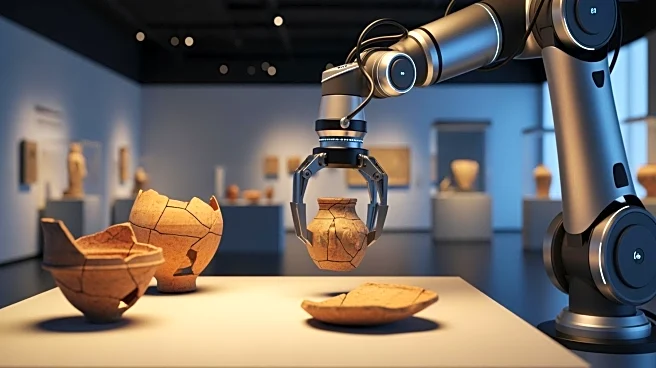What's Happening?
The increasing use of artificial intelligence (AI) in everyday tasks is reshaping how individuals engage in creative and critical thinking. With tools like ChatGPT and DALL-E becoming more prevalent, there
is a growing concern about whether people are still thinking for themselves. The article discusses how AI is not just a tool for efficiency but also a catalyst for transforming cognitive processes. It highlights that while AI can perform tasks like writing essays or summarizing complex texts, it lacks the nuanced critical thinking and emotional depth that humans possess. The article argues that AI should be used intentionally as a tool to enhance human creativity and thought, rather than as a crutch that diminishes these abilities.
Why It's Important?
The integration of AI into daily life has significant implications for education, creativity, and cognitive development. As AI takes over routine tasks, it frees up cognitive resources for deeper, more abstract thinking. This shift could lead to a transformation in how individuals approach problem-solving and creativity, potentially enhancing innovation across various fields. However, there is a risk that reliance on AI could lead to a decline in critical thinking skills if individuals do not actively engage with the technology. The article emphasizes the importance of maintaining independent thought and using AI as a tool to expand human potential rather than replace it.
What's Next?
As AI continues to evolve, its role in education and creative industries is likely to expand. Educators and policymakers may need to develop strategies to integrate AI into learning environments in a way that enhances critical thinking and creativity. There may also be a need for guidelines to ensure that AI is used ethically and does not reinforce existing biases. The ongoing dialogue about AI's role in society will likely focus on finding a balance between leveraging its capabilities and preserving the unique aspects of human thought.
Beyond the Headlines
The ethical implications of AI use are significant, as the technology can perpetuate biases present in its training data. This raises questions about the responsibility of developers and users to ensure that AI systems are fair and unbiased. Additionally, the potential for AI to create 'echo chambers' by reinforcing existing beliefs highlights the need for critical engagement with AI-generated content. The article suggests that the true value of AI lies in its ability to push humans toward more profound and reflective thinking, challenging them to question and explore beyond surface-level information.











